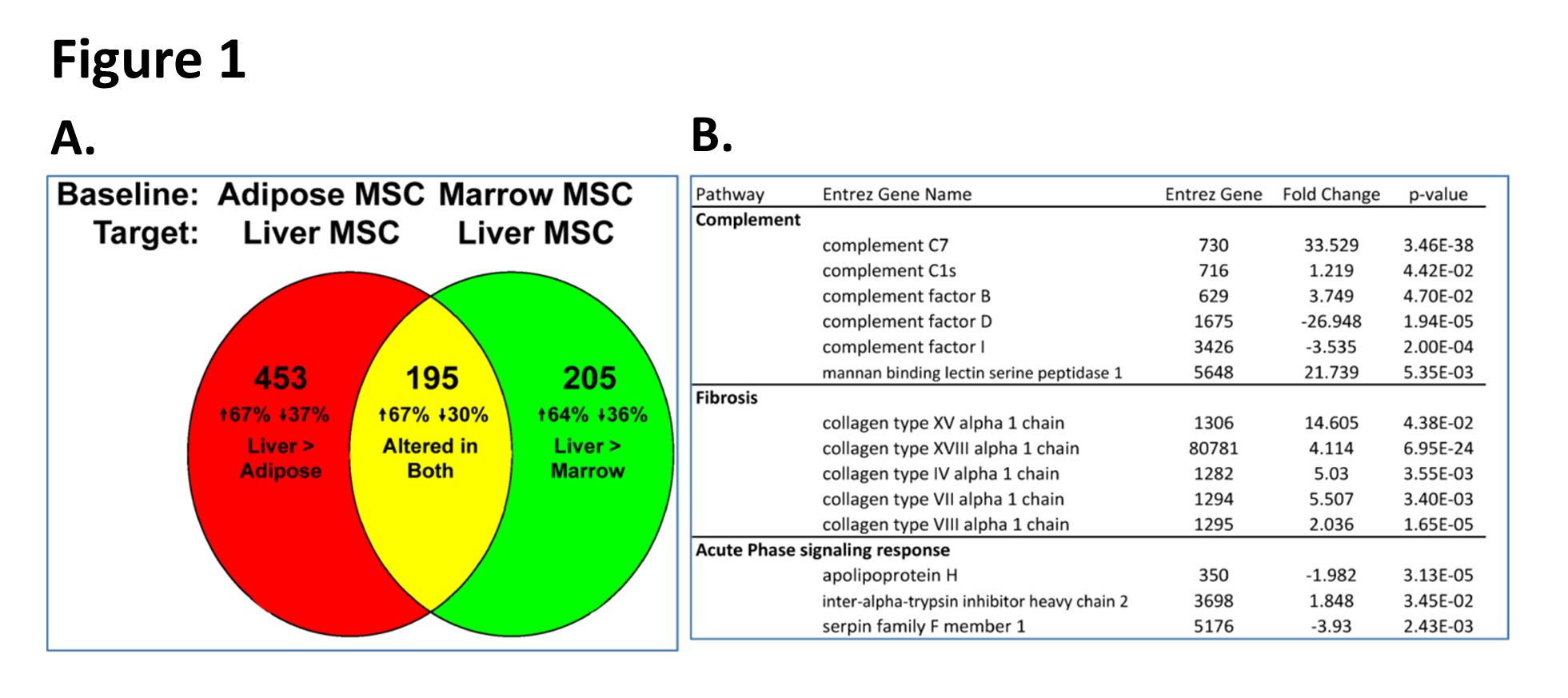Unique Genomic & Proteomic Profile of Liver Mesenchymal Stromal Cells is Associated with Their Superior Immunomodulatory Properties
Transplant Center, Mayo Clinic, Rochester, MN
Meeting: 2020 American Transplant Congress
Abstract number: A-324
Keywords: Immune deviation, Liver transplantation, T cell activation, Tolerance
Session Information
Session Name: Poster Session A: Biomarker Discovery and Immune Modulation
Session Type: Poster Session
Date: Saturday, May 30, 2020
Session Time: 3:15pm-4:00pm
 Presentation Time: 3:30pm-4:00pm
Presentation Time: 3:30pm-4:00pm
Location: Virtual
*Purpose: Investigating mechanisms of liver allografts’ relative tolerance, we recently reported that liver mesenchymal stromal cells (L-MSC) are superior in their capacity to inhibit alloimmune T cell responses compared to their counterparts in bone marrow (BM-MSC) and adipose tissue (A-MSC). Using a multi-platform approach, we investigated the genomic and proteomic differences between human L-MSC and BM/A-MSC.
*Methods: MSC were generated from liver, bone marrow and adipose biopsies from 12 individuals, and tested for phenotype and tri-lineage differentiation. Detection of mRNA was done by RNA-sequencing (Illumina), and secretome analysis through a label-free peptide MS1 intensity-based method to find differentially expressed proteins. No specimens in either set failed QC. Intensities of each sample were log2 transformed; quantile normalized and modeled using generalized linear models. Differences between groups were tested using standard statistical methods for high dimensional data. For analyses, p-values were corrected for multiple comparisons using Benjamini-Hochberg.
*Results: Geneset enrichment analysis revealed that 227 inflammatory genesets were over-represented in L-MSC vs. A-MSC/BM-MSC (p<0.05). Of those, 84 were related to T-cells, 25 to B-cells, 11 to macrophages and 11 to NK-cells. Remarkably, all of these genesets were associated with reduced immune reactivity and/or increased immunoregulation. The average number of proteins detected in the 12 samples was 1703±109 [1561-1872]. Principal components analysis and unsupervised clustering revealed that the secreted proteome is distinct among the 3 sources. Comparisons between the secretomes of L-MSC vs. A-MSC/BM-MSC demonstrated 195 proteins significantly different in both analyses (Fig 1A); clustered in 3 pathways (complement system, fibrosis and acute phase response signaling) (Fig 1B). L-MSC secretome had markedly reduced complement factor D (27 fold; p<0.001), a co-stimulator in cognate Ag-presenting cell:T cell interaction.
*Conclusions: L-MSC have different immune-related genomic and secretome signatures compared to A-MSC and BM-MSC. These data suggest that the MSC source influences the production of proteins secreted during culturing, and may contribute to their differential impact on alloreactive T cell proliferation observed in prior studies.
To cite this abstract in AMA style:
Yigitbilek F, Park WD, Abrol N, Stegall MD, Taner T. Unique Genomic & Proteomic Profile of Liver Mesenchymal Stromal Cells is Associated with Their Superior Immunomodulatory Properties [abstract]. Am J Transplant. 2020; 20 (suppl 3). https://atcmeetingabstracts.com/abstract/unique-genomic-proteomic-profile-of-liver-mesenchymal-stromal-cells-is-associated-with-their-superior-immunomodulatory-properties/. Accessed July 13, 2025.« Back to 2020 American Transplant Congress

